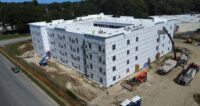Apartment-style hotel coming to Hampton in 2026
North Carolina-based stayApt Suites plans to open a 103-suite hotel in Hampton, with an expected opening in summer 2026.
VA1 Summit gives tourism pros chance to talk
Virginia tourism leaders will gather in Danville for the annual VA1 Summit to discuss innovation, AI and the future of travel.
Notable hotels opening across Virginia
Virginia’s hotel sector remains strong despite reduced federal travel, with new luxury and boutique properties opening statewide.
Temporary Petersburg casino to open in January
A temporary casino preceding the $1.4 billion Live! Casino & Hotel Resort in Petersburg is expected to open in January 2026.
Hospitality | Tourism 2025: ALBRECHT, CHRIS
In 2022, Albrecht assumed his current post overseeing the Danville casino, which opened in December 2024. The $800 million Caesars Virginia resort, with 1,200 employees, is the third permanent casino to open in the state, although a temporary venue was previously in operation. The property includes more than 90,000 square feet of gaming space, with […]
Hospitality | Tourism 2025: BRADBURN, DOUG
One of the most visited historic estates in the nation, Mount Vernon receives about 1 million visitors annually. Bradburn is overseeing a privately funded preservation project to ensure the structural integrity of George Washington’s mansion for decades to come. The $40 million project, which started in 2023 and will stretch to 2026, includes designing and […]
Hospitality | Tourism 2025: COLEMAN, CHRISTY S.
As head of the foundation administering two museums of early American history, Coleman is at the forefront of educators weaving a nuanced and inclusive story of American history. She is the first woman and the first person of color to serve as executive director of the state agency that operates Jamestown Settlement and the American […]
Hospitality | Tourism 2025: TERRY, ERIC
With four decades of hospitality experience, Terry has advocated for the Virginia Restaurant, Lodging & Travel Association’s 1,500-plus industry members since joining as president in 2014. VRLTA and Virginia Tourism Corp. announced in June that the 2026 VA1 Governor’s Tourism Summit — an annual gathering of 500-plus tourism professionals — will be at the Kalahari […]
Hospitality | Tourism 2025: KNIGHT, JUSTIN
As CEO of Apple Hospitality, a publicly traded real estate investment trust, Knight oversees more than 220 hotels, mainly Hilton and Marriott brands, across 37 states and Washington, D.C. He joined the company in 2000 and took over from his father, founder Glade Knight, in 2014. The elder Knight serves as the REIT’s executive chairman. […]
Hospitality | Tourism 2025: JAIN, AKHIL
Jain has run Landmark Hospitality Group for over a decade. With nearly 500 employees, the hospitality company manages, owns and develops hotels in North Carolina and Virginia under brands such as Marriott, Hyatt and Radisson. The company also expanded into housing in 2021, developing a 287-unit luxury apartment complex in Hampton. As part of the […]
Hospitality | Tourism 2025: HARDIE, MOLLY AND ROBERT
H7 Holdings is a private family investment company that owns and manages Keswick Hall and Golf Club in Albemarle County and the Hermitage Hotel in Nashville, Tennessee. Venture capital firm Level One Partners invests in the health care and life sciences sectors. The couple also runs the H7 Foundation, supporting educational and nonprofit endeavors, and […]






















